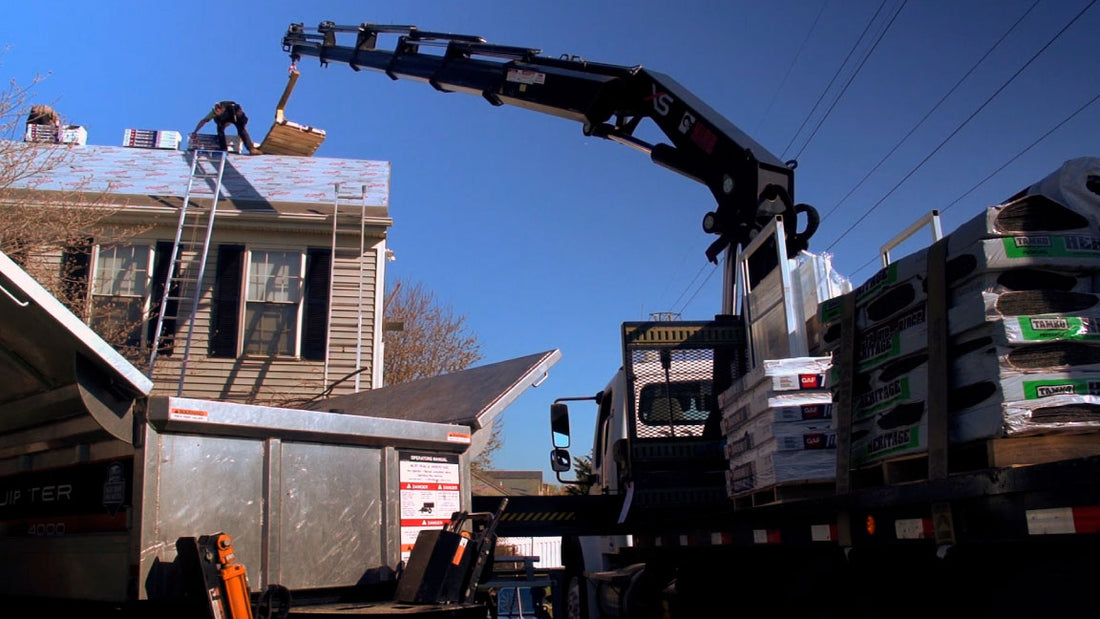For years, if you wanted to guarantee a smile on a residential roofer's face the morning of a job, uttering the words “rooftop delivery” would surely do the trick.
Of course it would. Roofing is a difficult, back-breaking line of work, and having the ability to get those heavy bundles of shingles delivered straight to the ridge by boom truck or crane would save a lot of time, effort, and energy.
So when rooftop delivery is an option for contractors, it is typically a good call.
So what’s the problem?
Even in roof top delivery markets, it’s not always reliable due to a variety of reasons. Plus, you’re paying for it–even if it isn’t always obvious.
Access Issues
“Nothing is worse than getting to a jobsite that’s expecting to get roof loaded and not being able to deliver due to property limitations,” Bob McElhinney, a crane operator whose company’s fleet delivers for a popular distributor, said.
Unfortunately, this happens at a higher rate than contractors realize.
Many factors contribute to the inability to roof load via crane at residential locations:
- The driveway’s ability to support a 75,000lb. truck
- The driveway’s shape (too narrow, winding, or steep)
- Power lines, wires, or tree branches are blocking access
- Vehicles parked in the driveway
- Unsigned Delivery Release permission forms from the homeowner allowing the crane in their driveway
If any of these factors come into play, not only will you not get roof loaded, but the contractor will incur additional fees from the distributor and, in most cases, have their material delivered on the ground.
Contractors must also weigh the current condition of the roof before it’s loaded by crane. The crane operator is not usually a qualified roof inspector, so the building owner and contractor will take all the liability and financial responsibility if any damage is caused to the roof.
Capacity Issues
The contractor’s biggest problem with rooftop delivery–and rightfully so–is the complete reliance on another company’s schedule.
Especially during busy seasons, the schedule for roof deliveries gets crowded. On top of that, trucks can easily go down and need maintenance, leading to even more scheduling problems.
If you get the call that your delivery won’t be roof loaded, what do you do?
If the roofer doesn’t have the proper tools available to lift those bundles, they have two choices; carry them up a ladder (which is both dangerous and an OSHA violation), or delay the job. Either way, this is how a morning of money making turns into one of regret and frustration.
The Fastest-Growing Alternative to Roof Delivery
While roof delivery might be the first choice, both contractors and distributors are starting to turn to a roof-loading alternative that’s been in practice for 50+ years; a Safety Hoist platform lift. These machines help contractors keep on schedule and remove the many property concerns that 75,000 lbs. boom trucks bring to each job.
If it’s not possible for distributors to rooftop deliver, you should have access to a Safety Hoist. Some distributors will even offer deals if their schedules are too tight. These machines, in most cases, cost under $3,500; affordable enough that you’ll break even within a handful of jobs.
Unlike cranes and boom trucks, Safety Hoists:
- Will work at any residential jobsite, regardless of the property’s build, power lines, and wires
- Are incredibly easy to transport
- Set up in 15 minutes
- Have both gas and electric models
- Protect both the roofer and the customer’s property
- Have many add-ons, including the hoist standoff, which adds extra protection to gutters
These hoists can even lift up to 500 lbs., or 6 bundles of shingles, at a time.
“My [Safety Hoist] helps in a variety of different ways,” Steve Follmar, a roofing foreman and a long-time Safety Hoist customer, said.
“It makes the job much faster and easier. It’s helped save my back for many years.”
Take your schedule into your own hands this spring. Call Safety Hoist at 610-941-4333, or ask your local distributor sales rep for a Safety Hoist today.

